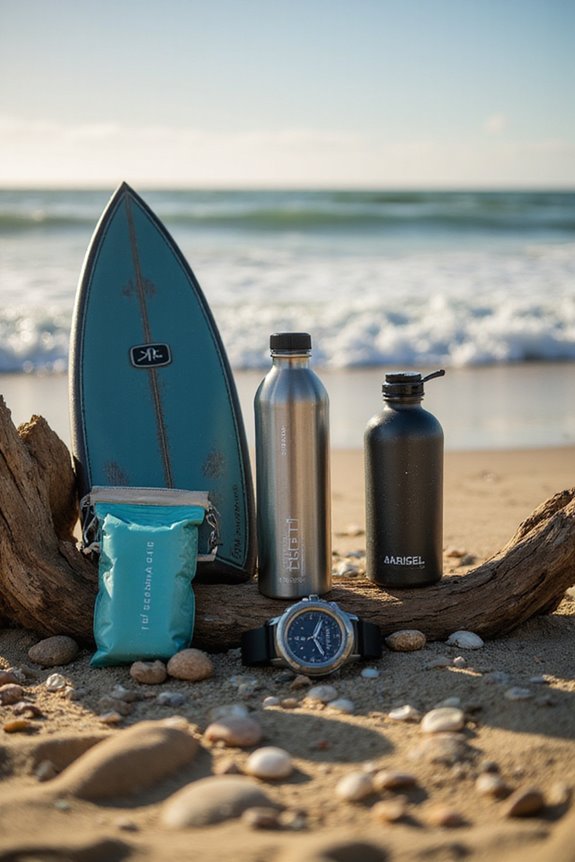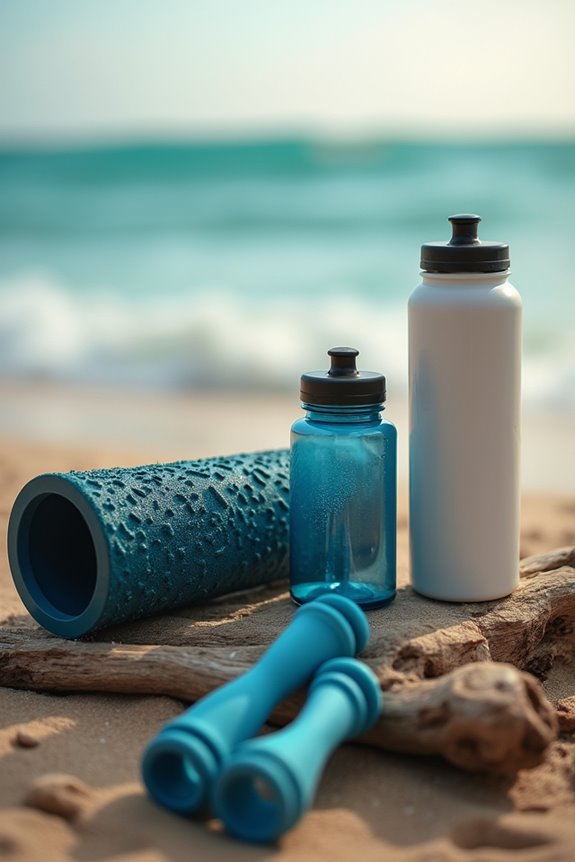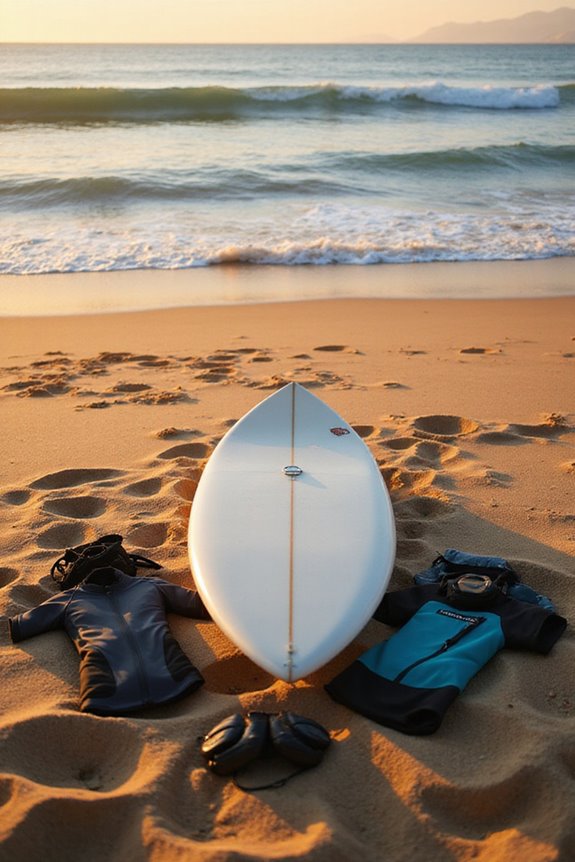To deal with surfing fatigue, we need to understand its causes and maintain proper hydration. We should hydrate before surfing, aiming for about 500 ml of water, and recognize dehydration signs like thirst and fatigue. Post-surf recovery techniques, such as balanced nutrition, foam rolling, and adequate sleep, are essential. Additionally, physical conditioning through strength training and pacing strategies can enhance our endurance. By implementing these practices, we can effectively manage fatigue and continue enjoying our time in the water. More insights on this topic await ahead.
Key Takeaways
- Stay hydrated before and during your surf session to prevent dehydration and maintain energy levels.
- Incorporate strength training and aerobic workouts into your routine to enhance endurance and reduce fatigue.
- Utilize recovery techniques such as massage, foam rolling, and cold therapy to minimize muscle soreness post-surf.
- Prioritize sleep and practice deep breathing to support mental recovery and overall well-being.
- Seek professional guidance if experiencing persistent fatigue or injuries for tailored recovery and performance strategies.
Understanding the Causes of Surfing Fatigue
When we think about surfing fatigue, it’s important to recognize that it stems from various physical, environmental, psychological, and injury-related factors. Physical exertion, like intense paddling, leads to muscle fatigue, especially when ocean conditions—such as wave height and water temperature—add environmental stress.
Psychological fatigue also plays a role; mental stress from anticipating challenges can increase our perception of tiredness. Additionally, injuries can further complicate fatigue, as pain and mobility issues may arise.
Cumulatively, these factors affect our endurance and performance. By understanding these causes, we can better prepare ourselves for effective surfing sessions and manage fatigue more efficiently. Incorporating proper safety precautions while surfing can help reduce the risk of injuries and enhance your overall experience in the water.
Importance of Hydration Before Surfing

Hydration plays a pivotal role in our surfing performance and overall experience in the water. Pre-surf hydration is essential since fluid loss occurs quickly during sessions, often averaging around 0.82% of body mass. For every additional 10 minutes we surf, our fluid loss increases by about 0.06 kg, emphasizing the need for adequate fluid intake beforehand.
To maintain ideal hydration, we should:
- Drink water and electrolyte fluids before heading out.
- Monitor our body mass to gauge hydration levels.
- Avoid caffeinated or alcoholic beverages that can hinder hydration retention. Additionally, consider using reef-safe formulas to protect both our skin and the oceans while enjoying the sun.
Effective Post-Surf Recovery Techniques

To guarantee we recover effectively after a surfing session, it’s essential to implement a variety of techniques that support our body’s needs. First, we should focus on nutrition strategies by consuming lean protein, fruits, and vegetables to aid muscle repair, while complex carbohydrates help replenish our glycogen stores.
Incorporating recovery modalities like massage therapy and foam rolling can enhance blood flow and reduce muscle tightness. Cold therapy, such as ice baths, helps minimize inflammation, while heat therapy promotes relaxation once acute issues subside. Additionally, using proper surfing equipment essentials can aid in preventing fatigue and enhance overall performance.
Lastly, prioritizing quality sleep—aiming for 7-9 hours nightly—and practicing deep breathing techniques can greatly enhance our overall recovery, reducing fatigue and improving performance for our next surf session.
Physical Conditioning to Enhance Endurance

Incorporating physical conditioning into our routine can greatly boost our surfing endurance. By focusing on strength training, we can enhance paddling efficiency and reduce fatigue. Exercises like push-ups and squats develop upper body and leg strength, while ring chin-ups improve shoulder durability.
For cardio conditioning, we should aim for low-level aerobic workouts twice weekly to build endurance. High-intensity sprint paddling drills can refine our fast-twitch muscle fibers, essential for catching waves. Interval rest periods during these drills will also enhance our recovery. Additionally, using balance boards for core strength can further improve stability and performance on the water.
Combining these strength and cardio routines guarantees we’re building a thorough fitness plan tailored for surfing. Consistent practice not only improves our overall performance but also helps prevent fatigue during long surf sessions.
Managing Muscle Fatigue During Surfing

As we push our limits in the water, recognizing and addressing muscle fatigue becomes essential for maintaining performance and safety. Key muscles involved in surfing include our core, back, shoulders, and legs. When we notice fatigue signals, like tired muscles and poor posture, it’s vital to act quickly. Ignoring these signs can lead to slower reflexes and diminished control over our surfboards, increasing wipeout risks. To aid muscle recovery, we should prioritize hydration and electrolyte management, especially in cold water. If we experience symptoms of fatigue, such as hesitation or misjudged maneuvers, it’s wise to take a break or even end our session to prevent injury. Early recognition is key for a safer, more enjoyable surfing experience. Additionally, staying warm in the water with a suitable wetsuit thickness can help maintain body temperature and reduce fatigue.
Pacing Strategies for Optimal Performance
When we surf, understanding how to effectively manage our energy is essential for maximizing performance and enjoyment. Key elements include paddle timing and wave selection. By starting to paddle early, we can match the wave’s speed, enhancing our chances of catching it effectively.
To conserve energy, we should select waves with a clean face and sufficient power, avoiding unnecessary paddling for every wave. Adjusting our stroke rate and length helps maintain speed without leading to fatigue. Additionally, maintaining balance through correct foot placement and a low stance allows us to maneuver efficiently while saving energy.
Using a high-quality wetsuit with flexibility and mobility can also help enhance comfort and performance during longer sessions, allowing for better energy management. Incorporating these strategies enables us to improve our overall performance and enjoy longer sessions on the water.
Recognizing and Responding to Dehydration
Recognizing dehydration’s signs is vital for maintaining our performance and safety while surfing. Common dehydration symptoms include thirst, fatigue, headaches, lightheadedness, and dizziness. As dehydration worsens, we might experience muscle pain, dry skin, chapped lips, and dark urine.
To guarantee we’re performing at our best, we need to respond promptly to these signs. Fluid replacement is imperative; we should aim to drink around 500 ml (17 oz) of water before surfing and consider electrolyte-enhanced drinks mid-session. If we lose more than 2% of our body weight, rehydrating with 1.5 liters of fluid per kg lost is necessary. By staying aware of our hydration status, we can enhance our surfing experience and prevent serious health issues.
Techniques for Monitoring Effort Levels
Several effective techniques can help us monitor our effort levels while surfing, guaranteeing we maintain ideal performance and avoid fatigue.
Wearable Technology
Using wearable technology like fitness trackers allows us to continuously monitor crucial stats such as heart rate and calories burned during sessions. These devices provide insights into our activity levels, helping us understand our performance better.
Heart Rate Monitoring
Heart rate monitoring is essential for identifying training intensity zones. This information helps us adjust our effort, optimizing endurance and recovery. Tracking heart rate fluctuations also signals when we need rest, especially during high-intensity paddling drills.
Paddle Cycle Analysis
Analyzing our paddle cycles can reveal energy expenditure and fatigue onset, allowing us to regulate our effort effectively. This way, we can guarantee sustainable performance throughout our surfing sessions.
When to Seek Professional Guidance
Deciding whether to seek professional guidance can be challenging, especially for dedicated surfers. We should consider consulting a professional when we experience persistent muscle soreness, sharp joint pain, or prolonged fatigue lasting beyond a few days. These signs can indicate the need for injury prevention strategies.
Additionally, if we notice decreased concentration, feelings of discouragement, or increased anxiety while surfing, it may be time to reach out for support. Regularly feeling dizzy or lightheaded can also signal a need for immediate assessment.
Seeking professional guidance from medical experts, physiotherapists, or sports psychologists can help us build mental resilience and develop effective recovery strategies. By addressing these concerns, we can enhance our overall surfing experience and guarantee our safety in the water.
Frequently Asked Questions
Can Surfing Impact My Mental Health and Fatigue Levels?
Absolutely, we’ve found that surfing benefits our mental health considerably. It boosts mental clarity while reducing fatigue levels, promoting positive emotions and social connections that enhance our overall well-being and resilience against stress.
How Does Surfing Frequency Influence Overall Fitness and Fatigue?
When we embrace regular surfing, we elevate our fitness levels and experience profound surfing benefits. By surfing frequently, we not only build strength but also reduce fatigue, enhancing our overall enjoyment and connection to the ocean.
What Role Does Sleep Play in Surfing Performance and Fatigue?
We understand sleep plays an essential role in our surfing performance. Sleep deprivation can hinder our recovery strategies, affecting our skills and endurance. Prioritizing quality sleep helps us ride waves more effectively and reduces fatigue.
Are There Specific Foods to Avoid Before Surfing to Reduce Fatigue?
We’ve all felt like a beached whale after a heavy meal! Let’s stick to light carbohydrate sources before surfing and prioritize hydration strategies to keep our energy up and avoid fatigue during those epic wave rides.
How Does the Surf Environment Affect My Energy Levels During Sessions?
The surf environment greatly affects our energy levels. Wave conditions and ocean temperature play key roles; warmer waters can lead to quicker fatigue, while challenging waves demand more from us, increasing our overall energy expenditure during sessions.







